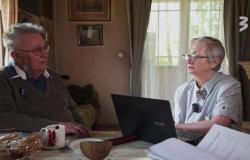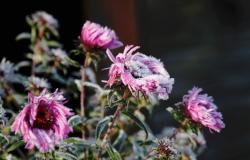
The sudden return of winter has surprised not only people, but also nature. Many bird lovers are concerned during these snowy days, especially after seeing footage from nest surveillance cameras, where many large birds are thoroughly dusted.
The cameras installed by the Latvian Nature Foundation allow everyone to follow live broadcasts from various places in Latvia where birds nest. What has been seen these days has caused pity in many people – the birds are so dusted that only their beaks can be seen; others have already laid eggs in their nests and are in the process of hatching. People calling and asking how to help animals.
“What’s happening to them has happened all along, we just haven’t seen it, but now we see it, and we as humans have empathy, we immediately empathize with this and think – what would it be like if I had walked in with a small child in the snow, and of course there is excitement. People also write and call us, but really – there is no reason to worry,” says Liene Brizga-Kalniņa, representative of the Latvian Nature Foundation.
The ornithologist Uģis Bergmanis is of the same opinion, who points out that the risk for laid eggs would be if the large birds left them in the cold for a long time.
Content continues after commercial
Advertising
“Of course, it’s good that people sympathize with birds, but biologically very short-term snow poses absolutely no danger. For example, in the black stork, eggs are barely laid, and freshly laid eggs are relatively cold-resistant than more hatched eggs. But, as I said, there is no reason to worry, the main thing is that the adult birds hatch these eggs,” explains Bergmanis.
But the sea eagles in Ķemeros hatched chicks a few days ago. The ornithologist points out that there is a risk if adult birds are forced to leave the nest for a longer period of time due to human-made conditions, then newly hatched babies may die.
“Such small, thermally unstable babies are significantly more sensitive to adverse weather conditions than freshly laid eggs. It is important that the female warms these babies and that there is a sufficient amount of food,” says Bergmanis.
In Durbe’s nest, a much more unnecessary problem than winter is that the sea eagle Milda has been left without a partner, and now the hatching of two eggs rests on her shoulders. Nesting is likely to fail.
“Because there must be a bird that protects the young, and a bird that provides food for them, they must change. We don’t want to speculate before something has happened, but there is a possibility that Milda will have a year off from raising children this year,” says Liene Brizga-Kalniņa.
The Nature Foundation states that if human involvement is needed, it will be reported, but under no circumstances should you help the birds with your own hands.
Report an error in the article
Highlight the incorrect text and press Ctrl+Enter.
Mark the wrong text and report it!
Tags: birds dusted nests Ornithologists comment sudden winter affects nesting





